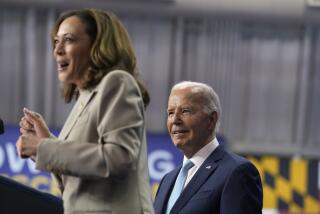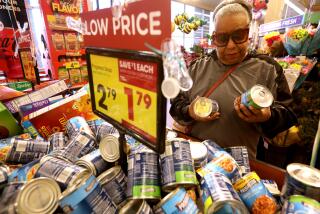Poland in Stew Over True Cost of Meat : Private Shops Complicate Financial--and Emotional--Equation
- Share via
WARSAW — For about 40 cents an hour, Czeslaw Ziomek, 65, was working the other day at one of the new private meat stalls in Warsaw. A retired butcher, he was happy about being able to add to his pension, but he was not sure he liked the idea of a private meat market in Warsaw.
“The prices,” Ziomek said, “are too high.”
He folded his heavy arms across his blood-stained apron and asked his questioner to recall--”Please, sir, for a moment”--the hard times Poland’s peasants went through before World War II.
“Before the war,” he said, “I didn’t see any meat at all. My father would go out to buy meat, but he would come back with bread. Now it is better.”
It is better, Ziomek said, because Poland’s Communist government now makes sure that every citizen of Poland is able to buy at least 2.5 kilograms of meat (5.5 pounds)every month from a state-run store at a strictly controlled price. Fifty years ago, Ziomek’s father could only dream of such a thing.
So now Ziomek regards with suspicion any trend that might threaten the system. To him, the appearance of private meat shops in Poland is an ominous sign. After all, he is a pensioner. The pension does not go very far. What would happen if the price of meat suddenly shot up?
He gave his final verdict before taking up his knife to go back to work:”This new thing, it is a bit of a failure.”
Nonetheless, the private meat shops seem to be a coming trend in Poland, notwithstanding the objections of people like Ziomek who regard the prices as shocking.
But the real cost of meat, in the present system, is beyond Ziomek’s calculation. It may be beyond anyone’s calculation.
Subsidies Questioned
About 60 private kiosks now sell meat at 16 different marketplaces in Warsaw and they are doing a booming business, despite prices that bring complaints from virtually all their customers. The prices range from two to three times the prices in the state meat stores, where government subsidies ensure the lowest prices.
Now that the Polish government is moving toward economic reform, the subsidies are being called into question and the public is worrying about the continued availability of relatively cheap food products.
According to Joanna Dynarzewska, an official in the mayor’s office in Warsaw, there could be as many as 2,000 private meat sellers in the city within a year, or perhaps two. “It is,” she says, “a kind of revolution.”
Like most revolutions, it is not going to come without distress. Right now, shoppers pay the equivalent of about 63 cents a pound for boneless beef in a state-run store. A choice fillet sells for $1.20 a pound. Those prices sound low by Western standards, but Polish incomes are even lower.
The average worker’s salary in Poland is about 27,000 zlotys a month, roughly $90, and economists here estimate that about 50%of that is spent for food.
“Meat has become the most popular topic of our home conversations,” journalist Marek Przybylik wrote recently. “One must admit that, along with progress in the economy, the importance of the pig has been lifted to a strategic level.”
A Warsaw housewife said: “Meat has always been an emotional issue to us. It is symbolic. It tells us whether things are good or bad.”
And meat prices, or increased meat prices, have brought major social upheavals in Poland--a fact that no government here is ever likely to forget.
Very Sensitive Issue
In 1970, Premier Piotr Jaroszewicz went on television--on a Saturday evening, when the stores were closed--to announce an increase in the price of meat and other foodstuffs. By the following Wednesday, riots had broken out in Gdansk and led ultimately to the resignation of Wladjslaw Gomulka, Poland’s Communist Party chief.
In 1976, when spontaneous demonstrations took place across the country following another round of price increases for meat, Edward Gierek, who replaced Gomulka, ordered the premier who announced the price increases to go back on television and rescind them.
With all that as background, the present government of Gen. Wojciech Jaruzelski is proceeding carefully as it tries to prepare the public for a general increase in prices that will accompany its economic reforms. In addition to widespread discussion in the press, a referendum is planned to ask voters to approve the government’s reform plan.
Although details of the reform plan have not been made public, major elements are expected to be a reduction of state subsidies, an increase in private business activity and a greater reliance on market forces in setting prices.
The private meat markets, which have emerged in the last year, may turn out to be a kind of preview of what the government has in mind. Their appearance helps to illustrate some of the problems involved in restructuring the economy. And the reception the new markets have evoked demonstrates the resistance to change here, even among citizens who claim that, for the most part, they favor genuine reform.
Poor Quality
Meat rationing was introduced in Poland in 1981, in response to demands put forward by Solidarity when the now-outlawed trade union movement was at its strongest. Solidarity’s demand came in response to a period of economic crisis when there was virtually no meat in the nation’s cities.
Strictly speaking, it is not a rationing system, but an entitlement system;each person is guaranteed a minimum meat allowance every month. The system has helped Poland limp through to the next stage of its continuing crisis, but it has not proved to be the ideal solution.
From the point of view of consumers, about the only advantage to the system is price, and for most Poles, meat is still no great bargain. Most government meat shops have long lines outside their doors, usually forming up to an hour before the doors open. Once inside, the customer often finds a pathetic supply of goods--the quality poor and the variety limited. But at least something is there, and most Poles remember when these shops were utterly bare.
Supplies in the stores continue to be spotty because of the low prices the government pays to producers. While pork production in Poland has been fairly constant, beef production has been falling in recent years because farmers say it simply does not pay to produce beef for the government market.
A year ago, the government decided to allow farmers to sell their meat themselves, in city marketplaces organized through farmer cooperatives or the state-run food cooperative. Under the system, the farmer must come to the city and sell his meat himself--no middleman is allowed--and he pays a rental fee to the cooperative for the use of the kiosk. In addition, the farmer must sell his meat in the market area in which it was produced--a measure designed to prevent supplies from flooding into the big cities at the expense of the smaller communities around the country.
The farmers were allowed to set their own prices, and customers were allowed to bargain.
Last week, at the Koszyki market in central Warsaw, Alfreda Bieniek, 30, who has a 60-acre farm south of the city, brought 350 pounds of pork to sell at prices that ranged up to $2.20 a pound. By midday, she had sold more than half of it, and business was continuing briskly, despite exclamations and protests from her customers.
“The prices are not so high,” she said. “I have my own costs to pay. I have to slaughter the pig, butcher it and bring it to the market, and I have to stand here and sell it. I am not getting rich.”
For the time being, Bieniek comes to the market once a month, taking her turn in the alloted space. As the system expands and more marketplaces are set up, she said, she might consider coming more often. Right now, she is selling all she can.
Her friend and neighbor, Wlodzimierz Tokaj, 28, was helping her in the stand, as she helps him on the days when his turn comes. He, too, said he was selling all the meat he could. Like most other farmers, he still sells meat to the state because this entitles him to buy coal, fodder and fertilizer from the state--the only source for affordable supplies of these essential farm needs.
“No, I am not forced to sell meat to the state,” Tokaj said. “But if I don’t sell meat to the state, I have no coal for the winter.”
Thus, the price of subsidized meat is directly related to the price of subsidized coal and forms just one of the complications involved in reforming--even deciphering--a socialist economy. If the Polish government were to remove subsidies for coal, fodder and fertilizer, it would surrender the leverage it needs to buy meat to supply the state-run stores. And if it gave up the state-run stores, it would risk the public’s outrage. Poland’s history shows what that can bring.
Clearly, most people are not ready to give up the coupons they use at the state meat stores.
“I buy meat here only when I have to,” said Eva Rybicka, a retired singer, who had been eyeing the cuts of pork piled on Alfreda Bieniek’s counter. She peered into her purse and reluctantly counted out small bills and change until she had enough to buy a quarter-pound of meat. She took it, like a small treasure, and set it carefully in the bottom of a plastic bag.
“The coupons are not enough,” she said, “especially for someone alone. It is easier for a large family to spread the coupons out.”
She looked again at the counter, where an elderly woman, standing uneasily on arthritic legs, bent over her opened purse, trying to decide what she could afford to buy. No, Eva Rybicka said, she would not like to see the coupon system end.
“You see,” she said, “for the ones alone, it is hard.”
Larger families have their problems, too. Mothers complain of the difficulty of stretching the coupons far enough to feed growing children. The coupons, they say, run out by the middle of the month.
With the arrival of the last week of the month, business is up noticeably at the private shops--as are prices in some cases. It is the old free-market principle of supply and demand, swinging at least temporarily in favor of the seller.
Still, most of the private meat kiosks sell out by the end of the day, giving some support to the impression that many Poles, however reluctantly, may be able to afford the higher prices. It is also assumed, by at least some officials, that the prices in the private meat shops will come down as their numbers increase.
But that expectation still leaves coal, fodder and fertilizer out of the equation, and that is why it will be some time before anyone figures out the cost of meat in Poland.
More to Read
Sign up for Essential California
The most important California stories and recommendations in your inbox every morning.
You may occasionally receive promotional content from the Los Angeles Times.













